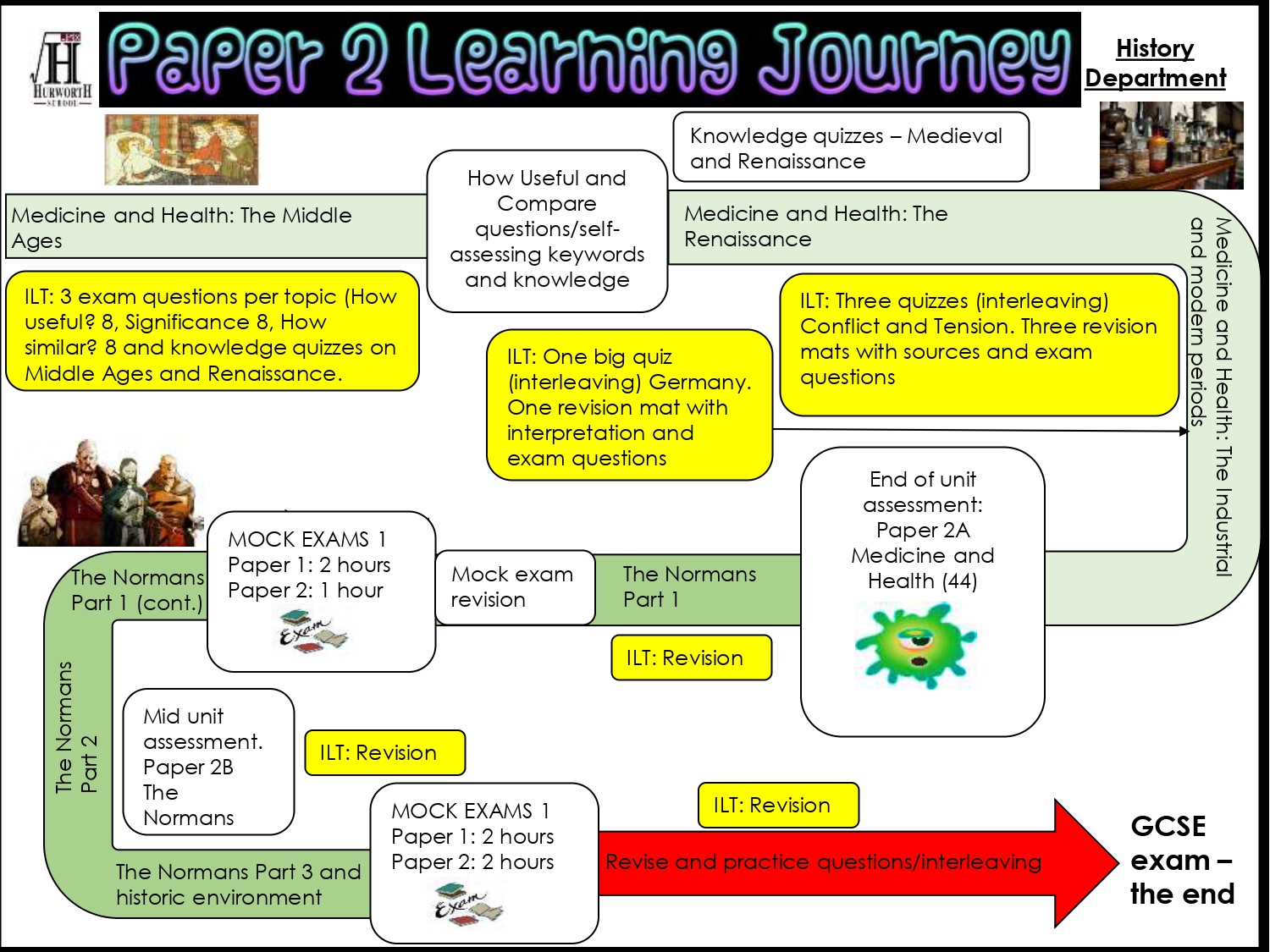History
Why do we study History?
The History Department believes that: ‘Those who cannot remember the past are condemned to repeat it.’ (George Santayana, The Life of Reason, Vol. 1, 1905)
As we strive to make the subject meaningful for all students; lessons in history will provide opportunities for reflective experiences, the ability to put our lives today into context and fully prepare our young people as well-informed citizens.
Studying history can launch enthusiasm and determination in students to understand how and why the past shapes our future. History can also help us to emphasise the need for tolerance and understanding in today’s society. History can help us to understand the complexity of people’s lives, the processes of change, diversity of different societies and relationships between different groups. History can help us to understand our own identity. History can help us to understand challenges which people have faced in their time, as well as understanding the challenges we face today.
Studying history means being able to write (and talk) in increasingly more sophisticated ways and confidently answering enquiry based questions to allow deeper conceptual thinking. Studying history means increasing our depth of knowledge, language, use of evidence and key ideas.
Year 7
Learning Outcomes
- Build upon understanding the chronology of key periods, events and people. Increasing confidence with evidence, and its uses – including key terms. Understand how to carry out historical enquiries and testing of hypotheses. Examine similarity and differences across periods of history and make links between and across arches of time. Show understanding of different interpretations
- Develop skills of extended writing with clear focus on constructing and sustaining a line of argument and writing accounts
- Develop the ability to apply knowledge to specific questions
- Develop skills of source analysis with particular focus on the usefulness and purpose of sources, as well as beginning to look at interpretations
- Develop understanding of second order concepts within topics, such as cause and consequence, change and continuity, similarity and difference, significance and the 5R’s
- Identify features and main events across the Roman period to the Middle Ages
Topics Taught
Autumn Term
- What is History? A historical skills unit
- The impact that the Roman invasion had on Britain and the north east of England
Spring Term
- The big problem of 1066 and reasons why the Normans won the Battle of Hastings
- Life after the Norman Conquest – What changes the Normans brought
Summer Term
- Life in the Middle Ages
- The power struggles in the Middle Ages between church and crown
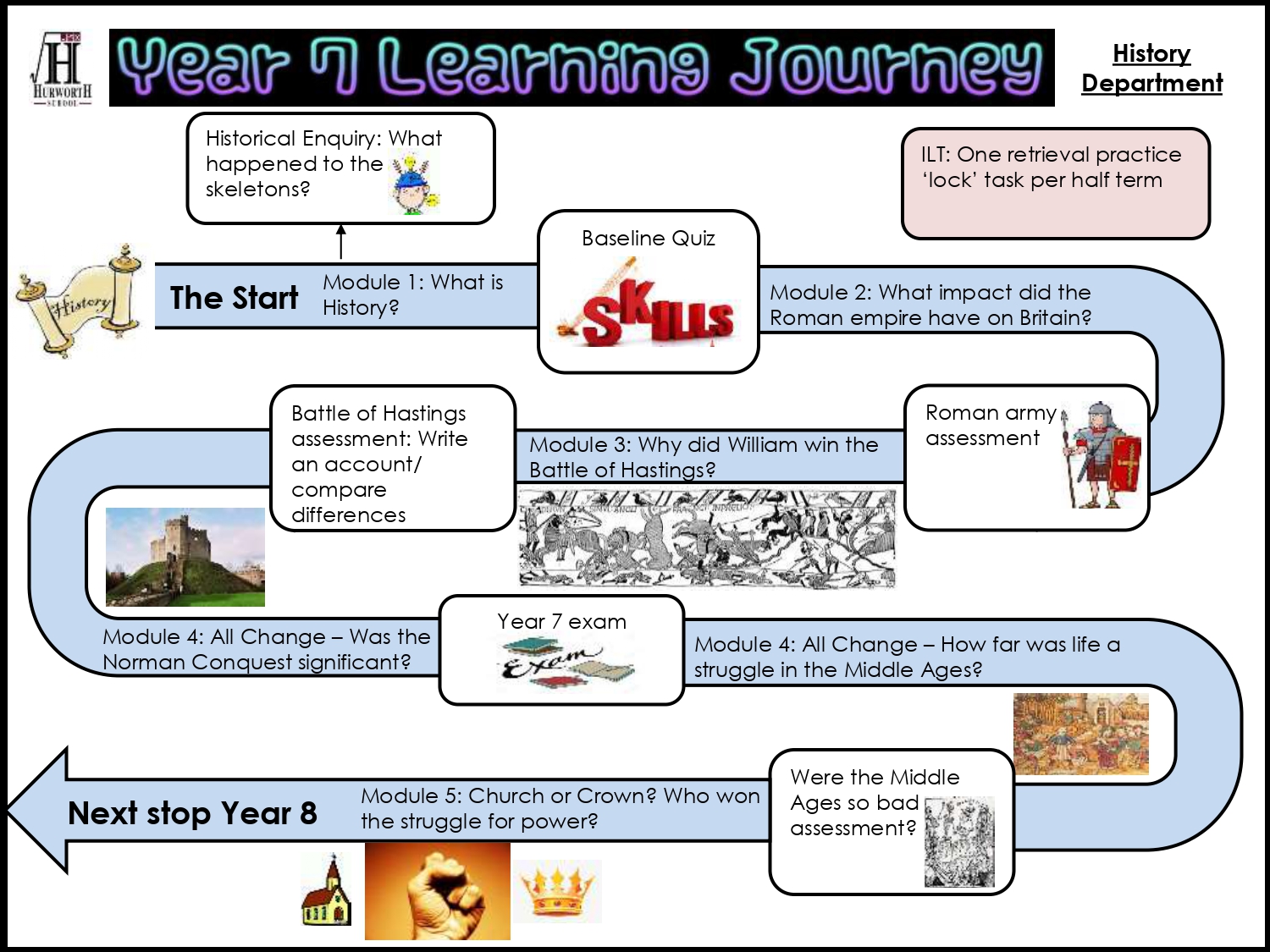
Year 7 Documents (click to download)
Year 8
Learning Outcomes
- Make increasingly confident use of sources and use those sources to answer questions about levels of change over arches of time. Develop skills of source analysis with particular focus on evaluating historical interpretations
- Further develop skills of extended writing with focus on using more detailed evidence to support a line of argument and reach clear substantiated judgements
- Apply greater detailed knowledge and key language when answering questions which relate to second order concepts such as cause and consequence, change and continuity, as well as developing analytical skills in terms of positive and negative impact across the short and longer arches of time
Topics Taught
Autumn Term
- When and why did Kings lose and regain power?
(Reformation, Civil War and Restoration) - Life in Early Modern England.
Spring Term
- The industrial revolution and how Britain became the workshop of the world
- Empire and slavery
Summer Term
- Women and the vote.
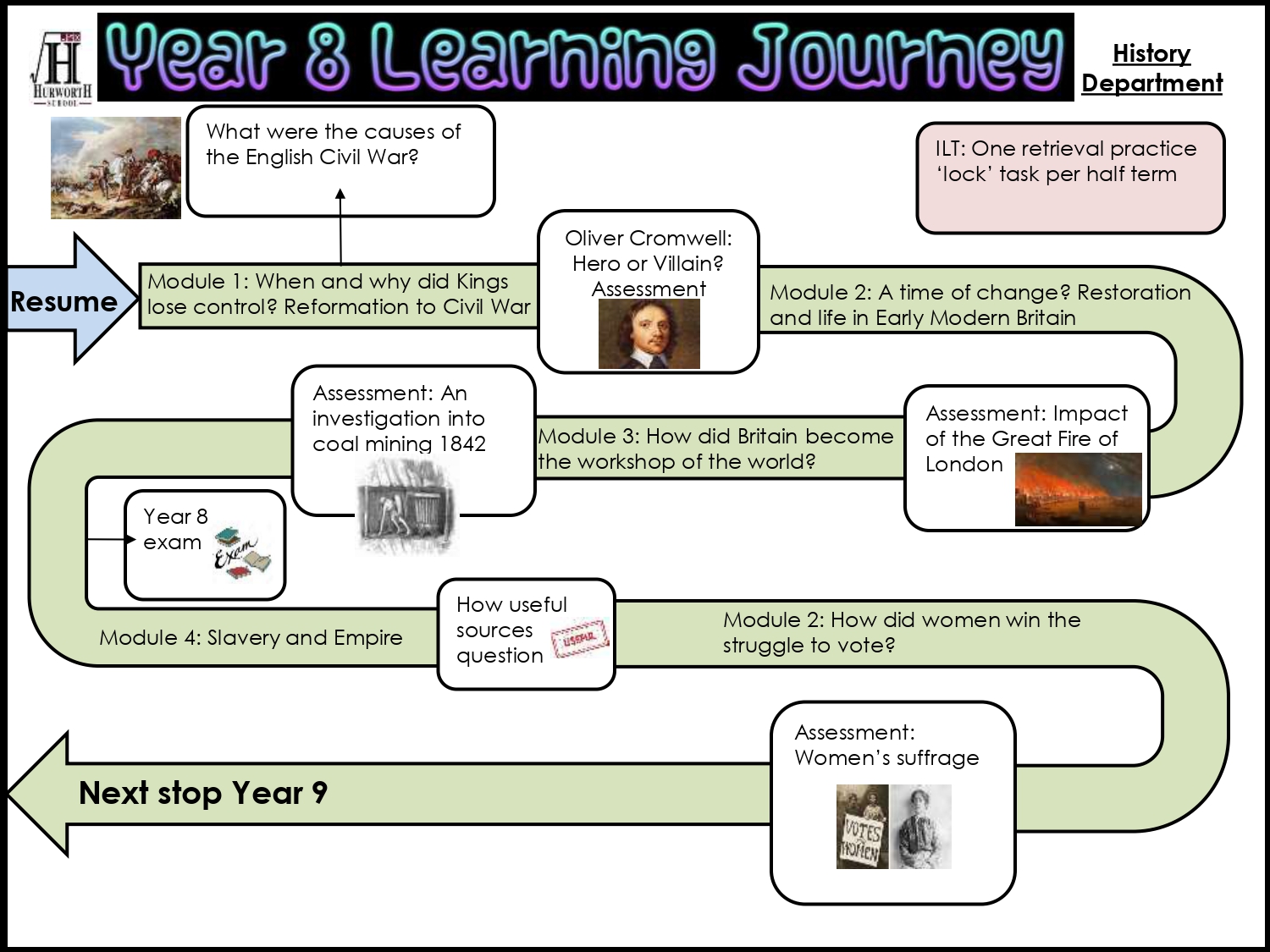
Year 8 Documents (click to download)
Year 9
Learning Outcomes
- Develop extended writing skills – producing clear line of argument, focused explanation and analysis and substantiated judgements in relation to GCSE questions
- Develop skills of source analysis – inferring meaning from sources, in particularly political cartoons and government propaganda, analysing utility of sources, comparing the content and provenance of sources and evaluating historical interpretations for ‘how convincing’ in relation to GCSE sources and interpretation questions.
- Developing student independence and framing their own questions, then substantiate conclusions with relevant source evidence.
Topics Taught
Autumn Term
- The causes of World War One
- DORA and the home front during World War One
Spring Term
- Challenges of the 20th century – democracy v dictatorships
- The Holocaust
Summer Term
- Conflict and Tension 1918-39 (AQA 8145) The Treaty of Versailles
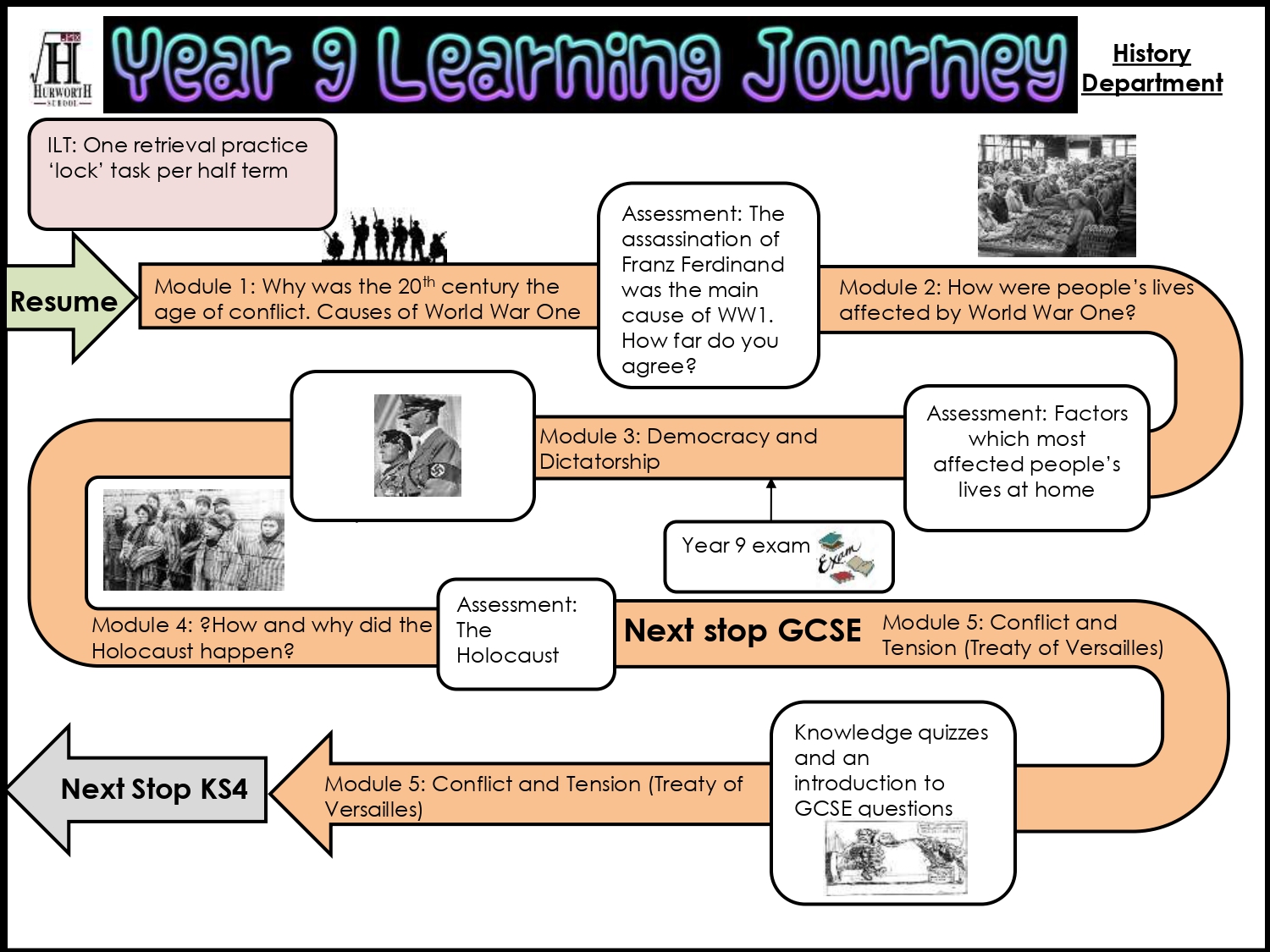
Year 9 Documents (click to download)
Year 10
Exam Specification
GCSE History
AQA Specification
Learning Outcomes
- Develop knowledge and understanding, and apply this knowledge and understanding in terms of causation, change and consequence, as well as evaluating interpretations
- Demonstrate knowledge and understanding in relation to causation and consequence. Write structured analytical narrative account of key events. Understand, analyse and evaluate a range of sources.
- Develop extended writing skills – producing clear line of argument, focused explanation and analysis and substantiated judgements in relation to GCSE questions
Topics Taught
Autumn Term
Paper 1B AQA 8145 Conflict and Tension 1918-1939 The League of Nations
Paper 1B AQA 8145 Conflict and Tension 1918-1939 The causes of World War Two
Spring Term
Paper 1A AQA 8145 Germany 1890-1945
Summer Term
Paper 2A Medicine and Health
AQA 8145 The Middle Ages and the Renaissance
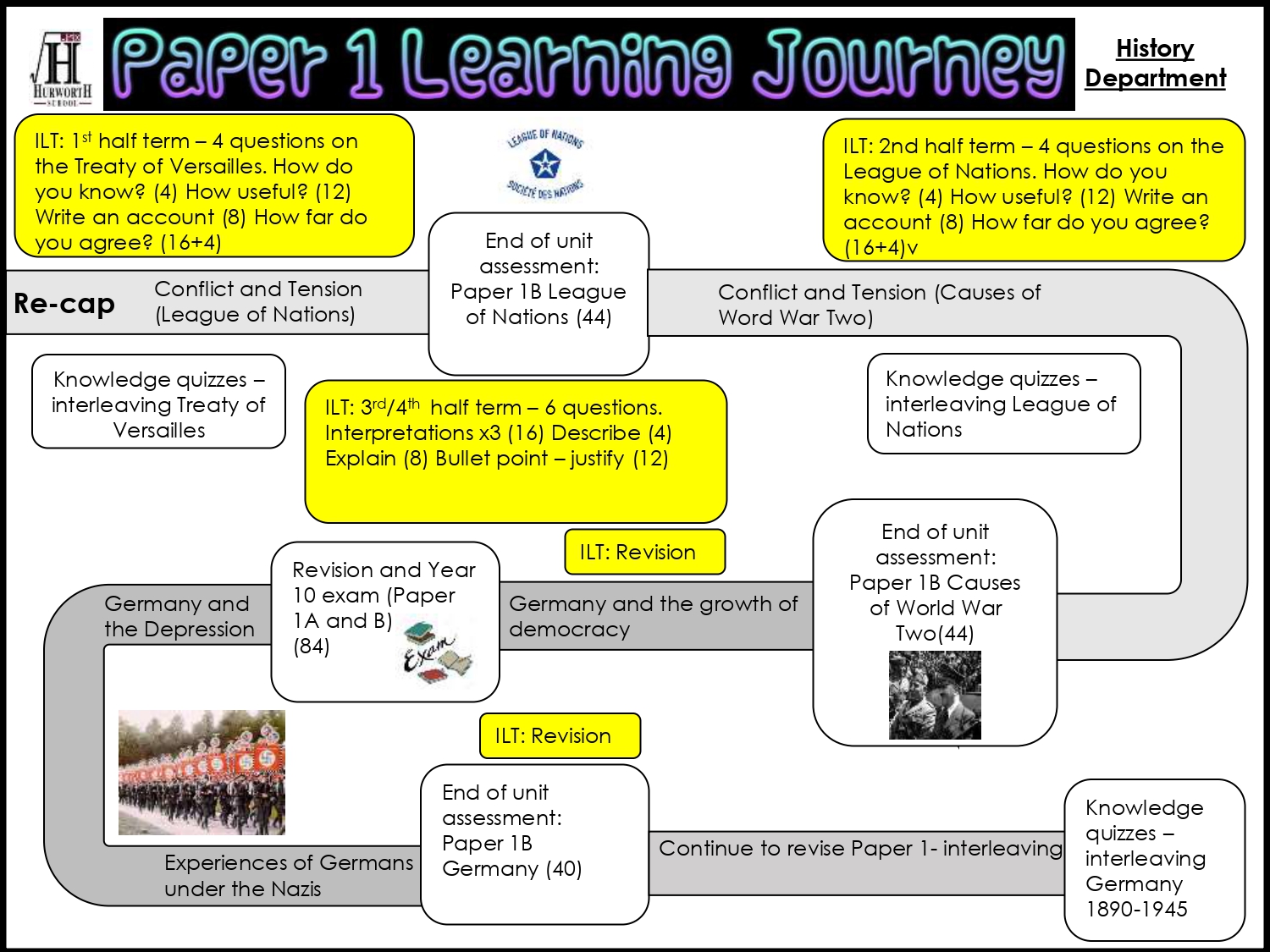
Year 10 Documents (click to download)
Year 11
Exam Specification
GCSE History
AQA Specification
Learning Outcomes
- Further develop ability to apply similarity, difference, change, continuity and significance to their knowledge and understanding of the period. Analyse and evaluate contemporary source material.
- Develop a coherent understanding of the complexity of society and different aspects within it and understand the nature of the historic environment and the events contained within the study.
- Made connections and evaluate how specific sites have shaped or been shaped by events and developments of the time. Application of causation, change and consequence to knowledge and understanding. Analyse and evaluate two interpretations to make their own historical claims.
- Develop extended writing skills – producing clear line of argument, focused explanation and analysis and substantiated judgements in relation to GCSE questions
Topics Taught
Autumn Term
Paper 2A Medicine and Health
AQA 8145 The industrial and modern periods
Spring Term
Paper 2B AQA 8145 The Normans
Revision
Summer Term
Revision
